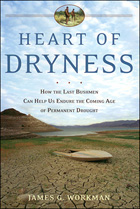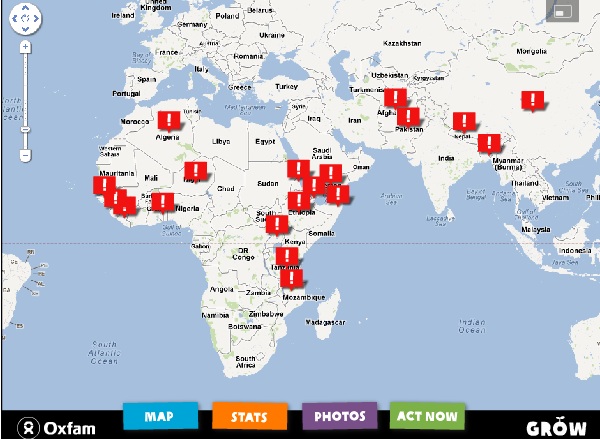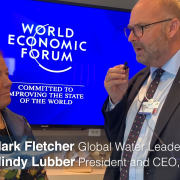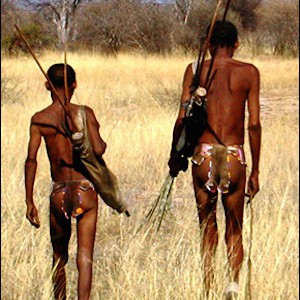Video: James G. Workman Discusses the Water and Climate Issues that Haunt Botswana’s Bushmen
Video courtesy of Vanessa Workman.
The video above and corresponding transcript below are a Q&A author James G. Workman did with the book’s publishers, Walker & Company. Find out more information about the book here.
What drew you to water?
As a journalist, I learned to follow the money. As you trace economic power to its source, you discover that water infuses our bloodstream and brain, our food, our electricity, our politics. As a boy I was shaped by statewide drought which became a force larger than my family or any government. Whether you’re religious or not, water remains the ultimate mystery. It’s a primal force that connects us to nature, and our access to water shapes how humans live, where we live, and increasingly, if we live.
Where does the title come from?
Beyond a reference to Africa in Conrad’s masterpiece Heart of Darkness, this book’s title describes a place—the arid core of the Kalahari, the farthest place from any river. It then evokes the empty soul of those who use water as a weapon to control the weak. Finally it reveals the desiccated heart of the heroine, Qoroxloo, who made the ultimate sacrifice during her long, defiant refusal to surrender.
Your book presents the Kalahari Bushmen of Botswana as a model for how to deal with water scarcity. The cultural divide between the Bushmen and more developed societies seems so vast—how can they possibly guide us and how can we bridge that divide to learn from them?
I won’t glamorize Bushmen, or urge us to imitate them. But their code of conduct works so well, as ours falters, that I question who is really ‘backward.’ Our so-called “more developed societies” still irrigate deserts, collapse atop depleted aquifers, amputate currents, blend urine and feces with tap water, kill salmon runs with dams, and evaporate more water than we consume. Because of such profligate waste—according to World Economic Forum or Goldman Sachs—we’re now hitting a wall, a limit to growth; well, Bushmen have lived with that wall for 30,000 years. Their proven strategies point us toward a softer, alternative approach, and they do so with laughter and dance.
Water scarcity is just one side effect of global climate change. Yet in the larger public conversation going on about climate change the water issue doesn’t seem to resonate. How can we connect the dots between climate change, water scarcity, and the survival of our civilization?
Even if we stop all carbon and greenhouse gas emissions, the world will keep warming. As it does, sudden deluge will alternate with longer, hotter, droughts. Floods let us store less; droughts leave us less to store. These extremes affect irrigation, depleting food supply. The lack of water also cuts energy production, depleting power supply. So climate adaptation literally boils down to water adaptation. And there is no civilization better adapted to doing more, with less water, than Kalahari Bushmen.
Most people in major population areas don’t think of the U.S. as water challenged—but we clearly are. How do water shortages in places like the southwest and southeast affect those living in areas with plenty of water, like New York?
Half the world is urban. But in our finite and interdependent world, no one is insulated. The aquifer depleted for biofuels or mining or oil production is put off limits to farms. A drought in the Midwest or Australia or China cuts the corn, wheat or rice on the open market. Even the rich aren’t immune. Water scarcity turns their neighbor against them; Catskill farmer against New Yorker; Atlanta shopkeeper against Coca-Cola CEO. Virginia against Maryland. Crises like 9-11 and Hurricane Katrina reveal the weakness of governments and the large heart of people as we all pull together. Well, drought pulls us all apart. And it leads to oppressive rules that ration and restrict our life, unless we adopt the Bushmen approach.
Water issues tend to be the province of states or local municipalities even though the decisions taken in one area can have profound regional and national consequences. Should the federal government step up and be more active? In addition, are there specific policies the U.S. government should undertake to help us preserve our water supplies?
Unlike trees, oil, or real estate, water is a fugitive resource. As rain, river or aquifer—water moves. As it flows it defies county or state boundaries: so a federal role remains essential in protecting the pulse and integrity of the Mississippi, Colorado or Ogallala Aquifer supply. That doesn’t mean Washington DC knows how to allocate water to meet all needs. There’s no way it can keep up with demand. What federal officials can do is defend every American’s secure and equal share of water—an individual right or ownership credit like the Bushmen knew—which people can use, save or invest as they wish. Breaking up that monopoly to allow exchanges would bring powerful forces to conserve, and drive a more efficient economy.
Read an excerpt here: Heart of Dryness Chapter 8, excerpt.










Leave a Reply
Want to join the discussion?Feel free to contribute!